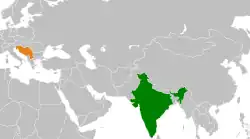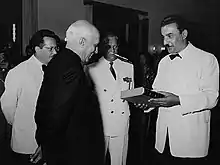India–Yugoslavia relations
India–Yugoslavia relations were historical foreign relations between India and now split-up Socialist Federal Republic of Yugoslavia. Yugoslavia established full diplomatic relations with India on 5 December 1948 following the 1948 Tito–Stalin split.[1] Initially two countries developed their relations at the UN Security Council in 1949 during their shared membership.[2] In the period of the Cold War both countries were the founders and among core members of the Non-Aligned Movement.
 | |
India |
Yugoslavia |
|---|---|
History

In the immediate period following the establishment of the bilateral relations the Embassy of Yugoslavia in London was responsible for Yugoslav relations with India, while the Embassy of India in Rome was responsible for Indian relations with Yugoslavia.[1] The Embassy of Yugoslavia in India (New Delhi) and the Consulate in Bombay were established as early as 1950.[1] In late 1954 and early 1955 President of Yugoslavia Josip Broz Tito visited India for the first time.[3] Tito was the first European leader who visited India after the independence of the country.[4] Indian Prime Minister Jawaharlal Nehru returned the visit in late June and early July 1955.[3]
At the 1956 Brioni Meeting President of Yugoslavia Tito, Indian Prime Minister Nehru and President of Egypt Gamal Abdel Nasser met on Brijuni islands in the Yugoslav constituent Socialist Republic of Croatia where they initiated the process which will lead to the establishment of the Non-Aligned Movement in 1961 at the Belgrade Conference.[5] In 1956 India and Yugoslavia signed the trade agreement in New Delhi.[6]
Following period was marked by the exchange of frequent meetings and intensive personal correspondence between Yugoslav and Indian leadership.[3] The new Indian Prime Minister Indira Gandhi visited Yugoslavia for the first time as a prime minister in 1966 which was followed by the return meeting of Tito in the same year.[3] Already in 1967 Indira Gandhi visited Yugoslavia once again, and the return visit was organized in 1968.[3] Tito and Indira Gandhi expressed identical attitudes regarding institutionalization of cooperation within the Non-Aligned Movement.[3] During the meeting in India in October 1971 Tito and Indira Gandhi both expressed concern over the treatment of Sheikh Mujibur Rahman who was arrested at the time.[7] President Tito was awarded the Jawaharlal Nehru Award for International Understanding during his visit to New Delhi in January 1974.[3]
See also
- Foreign relations of India
- Foreign relations of Yugoslavia
- India and the Non-Aligned Movement
- Yugoslavia and the Non-Aligned Movement
- Bosnia and Herzegovina–India relations
- Croatia–India relations
- India–Montenegro relations
- India–North Macedonia relations
- India–Serbia relations
- India–Slovenia relations
- Death and state funeral of Josip Broz Tito
References
- Jakovina, Tvrtko. "Yugoslavia on the International Scene: The Active Coexistence of Non-Aligned Yugoslavia". YU Historija. Retrieved 1 November 2020.
- Mišković, Nataša (2009). "The Pre-history of the Non-Aligned Movement: India's First Contacts with the Communist Yugoslavia, 1948–50" (PDF). India Quarterly. 65 (2): 185–200. doi:10.1177/097492840906500206. S2CID 154101021. Archived from the original (PDF) on 2022-01-13. Retrieved 2020-11-01.
- Ranka Rađenović; Miroslava Medaković (2018). БЕОГРАД – ЊУ ДЕЛХИ: Седамдесет година дипломатских односа/ BELGRADE–NEW DELHI: Seventy Years of Diplomatic Relations/ बेलग्रेड-नई दिल्ली राजनयिक संबंधोंकेसत्तर वर्ष. Archives of Yugoslavia & Ministry of Foreign Affairs of the Republic of Serbia & Embassy of the Republic of India in the Republic of Serbia. ISBN 978-86-80099-70-5.
- Tvrtko Jakovina (2017). "Jugoslavija na međunarodnoj pozornici: aktivna koegzistencija nesvrstane Jugoslavije" [Yugoslavia on the International Stage: Active Coexistance of the Non-Alignd Yugoslavia]. In Latinka Perović; Drago Roksandić; Mitja Velikonja; Wolfgang Hoepken; Florian Bieber (eds.). Jugoslavija u istorijskoj perspektivi [Yugoslavia in Historical Perspective]. Helsinki Federation for Human Rights Serbia. pp. 434–484. ISBN 978-86-7208-207-4.
- Krajcar, Dražem (18 July 2022). "Tito, Nehru i Naser na Brijunima dogovorili osnivanje Pokreta nesvrstanih – 1956". Povijest.hr.
- "TRADE AGREEMENT BETWEEN THE GOVERNMENT OF INDIA AND THE GOVERNMENT OF THE FEDERAL PEOPLE'S REPUBLIC OF YUGOSLAVIA [1956] INTSer 4". Indian Treaty Series. Retrieved 1 November 2020.
- Milutin Tomanović, ed. (1972). Hronika međunarodnih događaja 1971 [The Chronicle of International Events in 1971] (in Serbo-Croatian). Belgrade: Institute of International Politics and Economics. p. 2728.

.svg.png.webp)